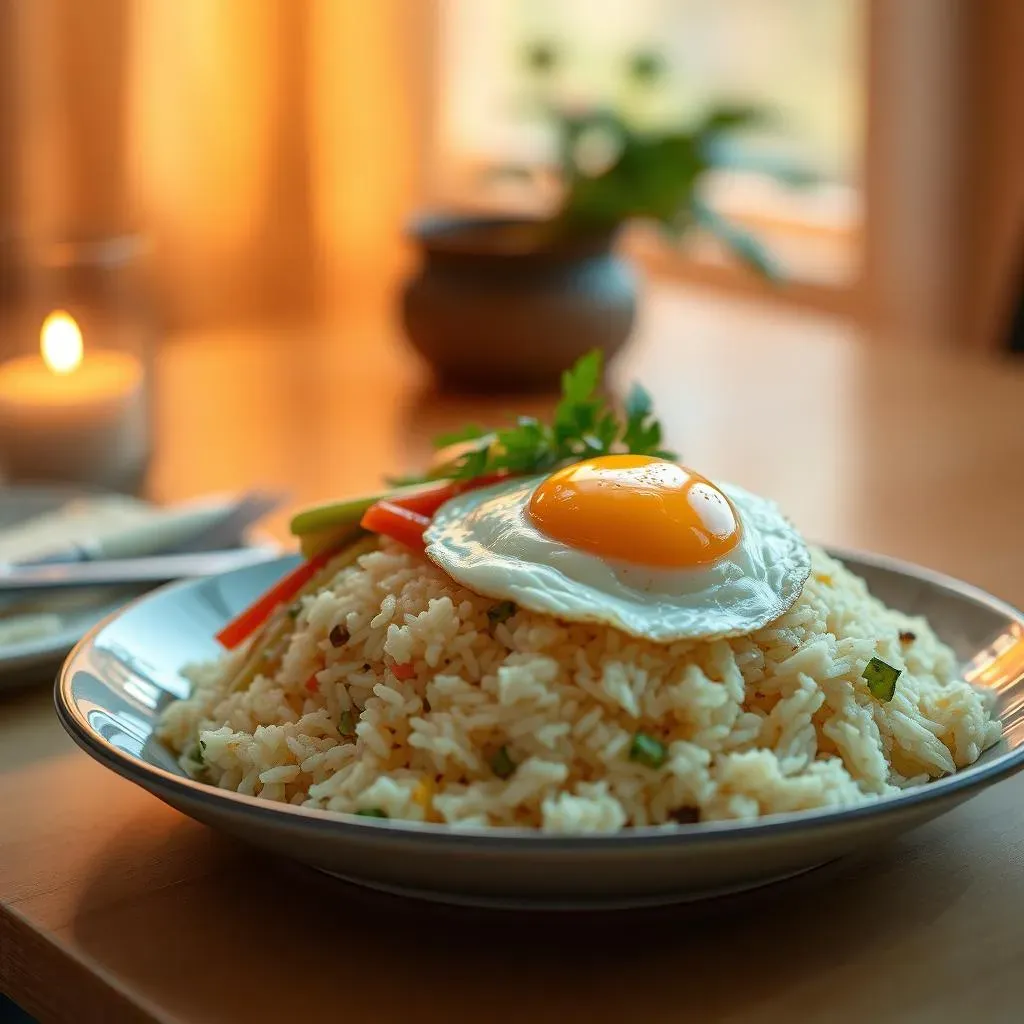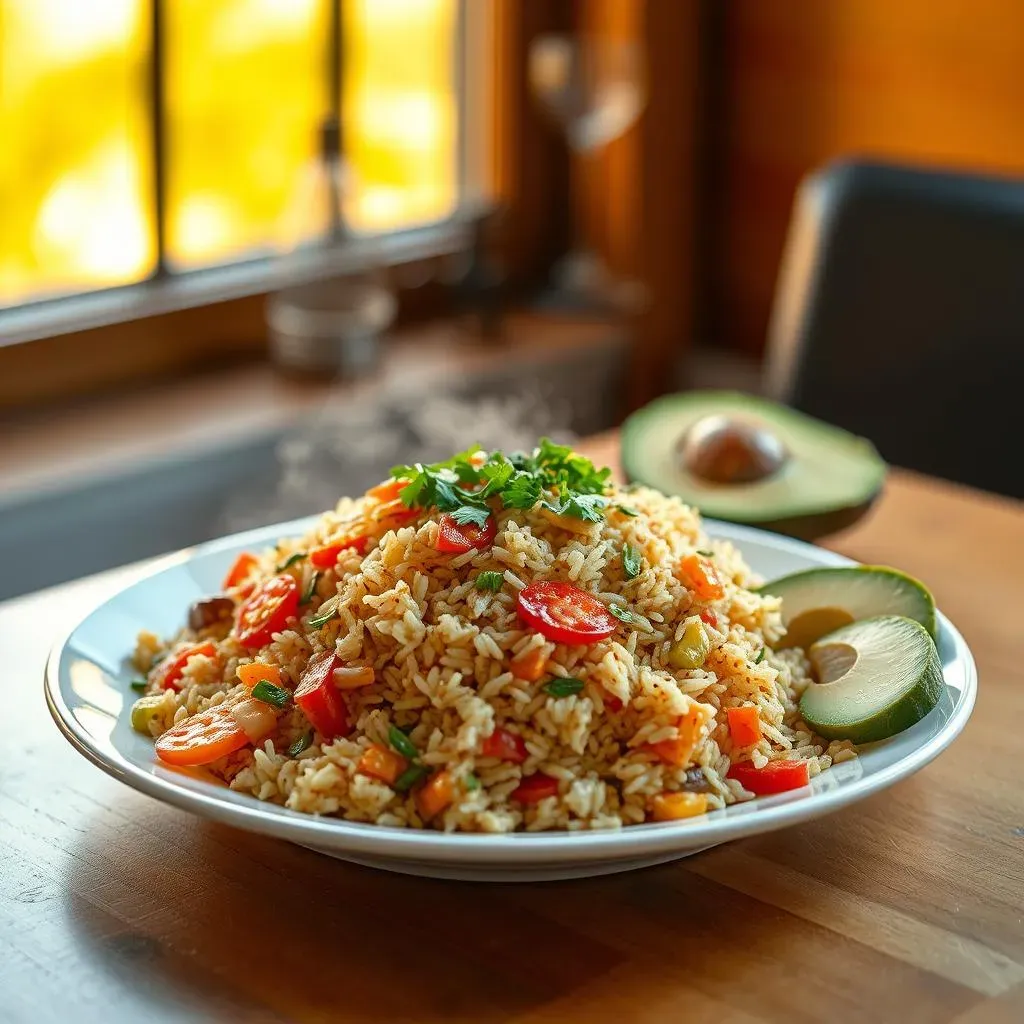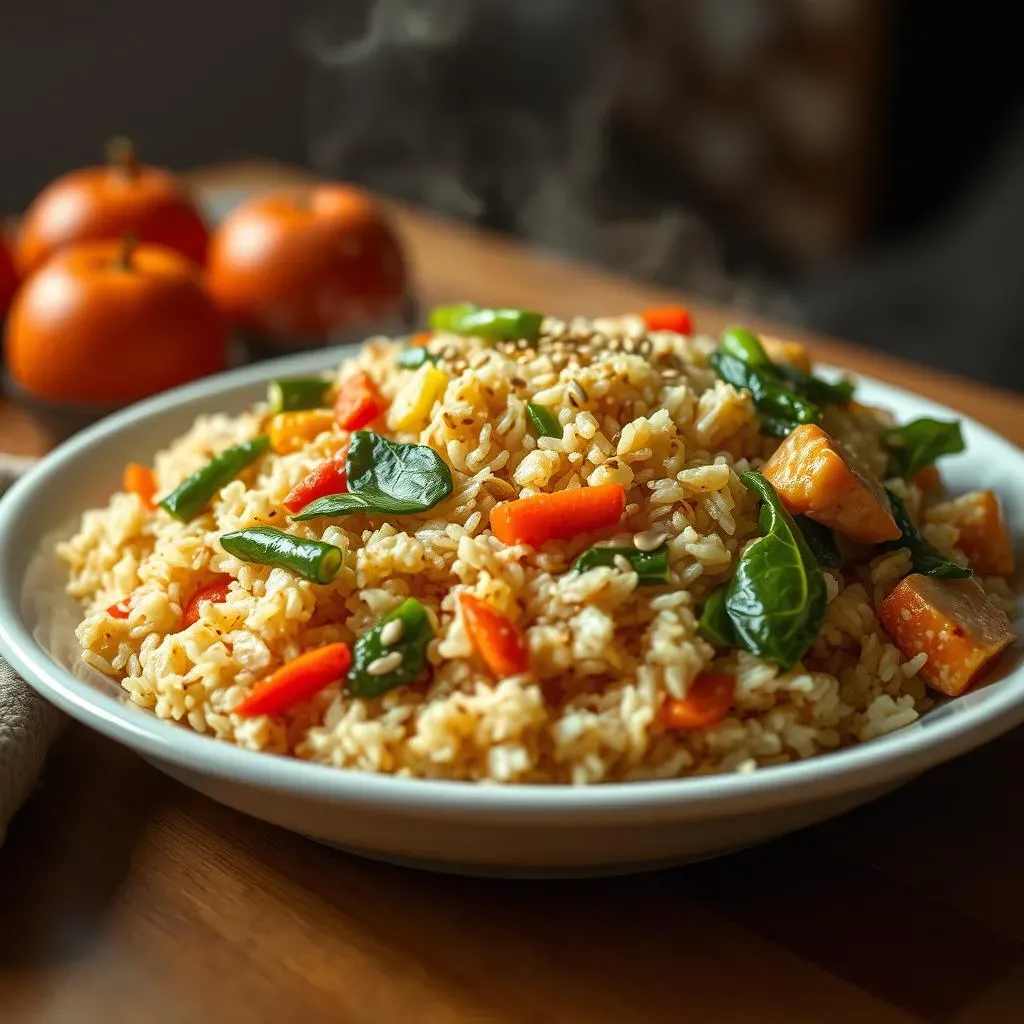Table of Contents
We all know the feeling of tossing and turning, desperately seeking a good night's sleep. You might've tried warm milk, counted sheep, or even downloaded a meditation app. But what if the secret to slumber was hiding in your kitchen? Yes, I'm talking about fried rice. Now, before you raise an eyebrow, hear me out. This isn't about any greasy takeout, but the possibility of findingsleep improvement benefits of fried ricewith a thoughtful approach. This article will guide you through the surprising connection between this popular dish and your sleep cycle. We will look at how specific ingredients can be your sleep allies, the best time to enjoy it, and practical ways to maximize its potential. We'll explore the science behind it all, address common concerns, and give you easy-to-follow tips. Get ready to rethink your nighttime routine and discover the unexpected power of a simple plate of fried rice. Let's get started.
The Unexpected Connection: Fried Rice and Sleep

The Unexpected Connection: Fried Rice and Sleep
The Carb Coma Myth
Okay, let's be real, we've all heard that carbs make you sleepy. It's like a universal truth, right? But it's not as simple as that. It's not just any carb that'll send you off to dreamland. The type of carb, the amount, and what you eat it with makes a huge difference. When we talk about fried rice, we're talking about a dish that can be a mix of complex and simple carbohydrates. The rice itself, especially white rice, breaks down quickly. This can cause a spike in blood sugar, followed by a crash. That crash? Yeah, that can make you feel drowsy, but not necessarily in a good way for sleep. It's a tricky balance.
Beyond the Rice: Ingredients Matter
But hold on, fried rice isn't *just* rice. It's a playground of ingredients. Think about it: eggs, veggies, maybe some chicken or tofu. These additions are what make or break fried rice's sleep potential. For example, eggs are packed with protein, and some studies suggest that protein can help stabilize blood sugar levels, preventing those dramatic spikes and crashes. Vegetables provide essential vitamins and minerals. These nutrients support overall health, which, in turn, can promote better sleep. It's all interconnected. The right combination can transform a simple plate of fried rice into a sleep-friendly meal.
The Sleepy Tryptophan Connection
Here's where it gets interesting. Some ingredients in fried rice, like chicken or eggs, contain tryptophan. This amino acid is famous for being a precursor to melatonin, the sleep hormone. Now, it's not like eating fried rice will send you into an instant coma, but it can certainly nudge your body in the right direction. The combination of carbs, protein, and a touch of tryptophan creates the perfect storm for relaxation. It's a slow burn, a gentle nudge towards sleep, not a sudden knockout. It's like a lullaby on a plate, if you play your cards right.
Ingredient | Potential Sleep Benefit |
|---|---|
Rice (especially white) | Quick energy, can lead to drowsiness due to blood sugar fluctuations |
Eggs | Protein source, stabilizes blood sugar, contains tryptophan |
Chicken | Protein source, contains tryptophan |
Vegetables | Vitamins and minerals for overall health, which supports sleep |
How Ingredients in Fried Rice Impact Sleep Quality

How Ingredients in Fried Rice Impact Sleep Quality
The Glycemic Index Game
Let's talk about the glycemic index, or GI. It's basically a measure of how quickly a food raises your blood sugar levels. High GI foods, like plain white rice, cause a rapid spike, followed by a dip. This rollercoaster can mess with your sleep. When your blood sugar crashes, your body releases stress hormones, and that's not a recipe for a peaceful night. However, fried rice often has other ingredients that can help slow things down. The fats and proteins can moderate the blood sugar response, making it less of a wild ride. It's all about creating a balanced plate.
Fat's Role in Sleep
Now, you might think that fat is the enemy, but healthy fats are actually your friend when it comes to sleep. Fats can slow down the digestion process, which means that the energy from your meal is released more gradually. This steady supply of energy can help prevent those late-night hunger pangs that can wake you up. Think of adding a drizzle of sesame oil or including some avocado in your fried rice for those benefits. The type of fat also matters. Unsaturated fats, like those found in avocados and nuts, are much better for you than saturated fats. They're basically the superheroes of sleep.
The Power of Specific Veggies
Don't underestimate the impact of vegetables in your fried rice. Certain veggies are packed with nutrients that can aid sleep. For example, leafy greens like spinach contain magnesium, a mineral that's crucial for muscle relaxation and sleep. Onions and garlic contain compounds that may help reduce stress and promote calmness. Even the simple addition of carrots adds a dose of vitamin A, which supports overall health. So, while you're focusing on the rice, remember the supporting cast of veggies. They play a vital role in making your fried rice a sleep-friendly dish.
Ingredient | Glycemic Index Impact | Sleep Benefit |
|---|---|---|
White Rice | High GI, rapid blood sugar spike | Can cause drowsiness, but unstable for sleep |
Vegetables (Spinach, Onions) | Low GI, slow blood sugar release | Nutrients support relaxation and calmness |
Healthy Fats (Sesame Oil, Avocado) | Slows digestion | Provides steady energy, prevents nighttime hunger |
Protein (Eggs, Chicken) | Moderate GI impact | Stabilizes blood sugar, contains tryptophan |
Timing is Key: When to Eat Fried Rice for Better Sleep

Timing is Key: When to Eat Fried Rice for Better Sleep
The Golden Window
Okay, so you're on board with the idea that fried rice *can* be sleep-friendly, but here’s the thing: timing is everything. It's not just about *what* you eat, but *when* you eat it. Imagine your body is like a finely tuned clock. Eating too close to bedtime can throw that clock out of whack. When you eat a big meal right before bed, your body is busy digesting, not relaxing. Ideally, you want to give your body about 2 to 3 hours to digest your fried rice before hitting the pillow. This allows your blood sugar levels to stabilize and your body to transition into a state of rest. Think of it as giving your digestive system a chance to wind down before you do.
Avoiding the Late-Night Feast
Now, let's talk about the opposite: eating fried rice too late. When you eat late, especially a meal that's high in carbs, your body is working hard when it should be winding down. This can cause indigestion, heartburn, and even those dreaded late-night wake-ups. Your body's metabolism slows down at night. This means that the calories you consume are more likely to be stored as fat. Not ideal if you're aiming for a healthy sleep and weight. It's like trying to run a marathon right after a big feast – your body just isn't ready for it. So, aim for that sweet spot a few hours before bed.
Listen to Your Body
Ultimately, the best time to eat fried rice before bed is going to vary from person to person. It really comes down to listening to your body. Pay attention to how you feel after eating. If you find that eating fried rice a couple of hours before bed leaves you feeling restless, try shifting that meal a little earlier. Start experimenting with different meal times. Notice how your body reacts. A good rule of thumb, if you're unsure, is to avoid heavy meals within 3 hours of bedtime. This gives your body ample time to process the food before you settle in for the night. It's not about strict rules, but about finding what works best for you and your unique sleep clock.
Timing | Potential Impact on Sleep |
|---|---|
2-3 hours before bed | Allows for digestion, stabilizes blood sugar, promotes relaxation |
Too close to bedtime | Digestion interferes with sleep, potential for indigestion, blood sugar spikes |
Too early before bed | May lead to hunger pangs before bed |
Practical Tips: Maximizing Sleep Improvement Benefits of Fried Rice

Practical Tips: Maximizing Sleep Improvement Benefits of Fried Rice
Choosing the Right Rice
Okay, let's talk rice. It's the base of our fried rice, so it matters. While white rice is the most common, it's not the best choice for sleep. It's high on the glycemic index, meaning it can cause those blood sugar spikes and crashes we talked about. Instead, opt for brown rice or even quinoa. These are complex carbs that release energy more slowly and provide additional nutrients. Brown rice also contains magnesium, which is a great mineral for relaxation. It's like upgrading your car to a model with better suspension – smoother ride all around.
Protein Power-Up
Don't skimp on the protein! It's crucial for stabilizing blood sugar and providing that gentle nudge towards sleep. Include eggs, chicken, or tofu in your fried rice. If you're feeling adventurous, try adding some edamame or lentils for a plant-based protein boost. Remember, tryptophan is your friend, so don't be shy about adding protein sources that contain it. It's like adding a weighted blanket to your meal – a comforting and calming effect.
Veggie Variety
Get creative with your veggies! The more colorful your fried rice, the better. Include leafy greens like spinach and kale for magnesium. Add onions and garlic for flavor and potential stress-reducing benefits. Don't forget about carrots, bell peppers, and broccoli for an extra dose of vitamins. It's like creating a rainbow on your plate, each color offering a unique set of benefits.
Healthy Fats Are Your Friend
Don't be afraid of healthy fats! A drizzle of sesame oil or a dollop of avocado can make a world of difference. These fats slow down digestion, providing a steady release of energy and preventing those midnight hunger pangs. It's like adding a smooth layer of comfort to your meal. Just make sure to use unsaturated fats, like those found in avocados, nuts, and seeds.
Spice it Up Wisely
While a bit of spice can be fun, go easy on the hot stuff, especially close to bedtime. Spicy foods can cause heartburn and indigestion, which definitely won't help you sleep. Instead, focus on using herbs and spices that promote relaxation, like ginger or turmeric. It's about finding the right balance of flavor without setting your digestive system on fire.
Portion Control
It's tempting to load up your plate, but portion control is key. Overeating, especially before bed, can cause discomfort and disrupt your sleep. Aim for a moderate portion that satisfies you without making you feel overly full. It's like finding the perfect amount of water in your teacup – just enough to enjoy, not so much that it overflows.
Tip | Why it Helps |
|---|---|
Choose brown rice or quinoa | Complex carbs, steady energy, magnesium |
Add protein (eggs, chicken, tofu) | Stabilizes blood sugar, contains tryptophan |
Include colorful veggies | Vitamins, minerals, relaxation benefits |
Use healthy fats (sesame oil, avocado) | Slow digestion, steady energy, prevents hunger |
Go easy on the spice | Prevents heartburn and indigestion |
Practice portion control | Avoids discomfort and disrupted sleep |
Mindful Eating
Finally, remember to eat mindfully. Don't rush through your meal while watching TV or scrolling through your phone. Take the time to savor each bite. Focus on the flavors and textures of the food. This can improve digestion and enhance your overall mealtime experience. It's like giving your meal the attention it deserves, and in turn, your body will thank you with a good night's sleep.